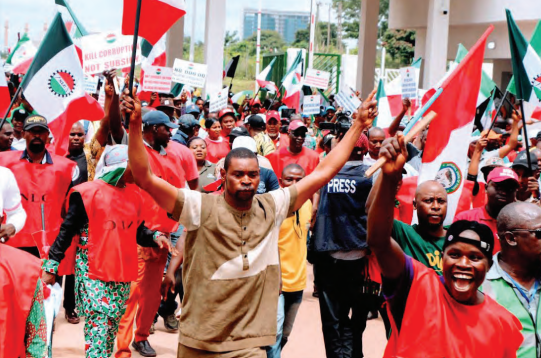Nigerian workers have presented another set of demands to the federal government towards improving their living condition.
The demands were unveiled yesterday in Abuja by the president of the Nigeria Labour Congress (NLC), Comrade Joe Ajaero, and his Trade Union Congress (TUC) counterpart, Comrade Festus Osifo.
The unionists, who spoke at a rally to mark this year’s edition of the Workers’ Day, said the success of any government should be measured by its impact on the lives of the people, not by promises or control.
They called for a return to a nation where the people are the focus, stating that this would reduce corruption, insecurity, and the exodus of citizens seeking education, medical treatment and better life abroad.
Highlighting the importance of the workforce, the labour leaders urged the government to recognise that improving workers’ conditions is not charity but a necessity for national productivity and growth.
They demanded that the ongoing national minimum wage negotiations reflect the economic realities faced by Nigerian workers and result in a living wage that motivates and inspires creativity.
The labour centres also gave one-month ultimatum to the federal government to declare a new minimum wage or face industrial action.
They also touched on the need for leaders to show patriotism and commitment to building a nation that can be a source of pride for all citizens.
The labour leaders condemned the use of violence in civic engagement and called for an immediate investigation into the case of Journalist Segun Olatunji, who was allegedly abducted and brutalised by security operatives.
Among the key demands presented to the federal government yesterday include restraint from violence in industrial relations, reversal of the hike in electricity tariffs and implementation of service-reflective tariffs, expansion of the National Labour Advisory Council’s (NLAC) activities and the establishment of tripartite workplace audits.
Other demands are nationwide rollout of Compressed Natural Gas (CNG) buses, full implementation of the October 2 agreement with the government, registration of new unions in the informal sector, a rethink of the presidential system of government and review and potential reversal of the electricity privatisation exercise.
The organised labour also put forward a support for a two-state solution in the Middle East, preservation of the Pension Transitional Arrangement Directorate (PTAD), payment of the promised N25,000 palliative to pensioners, negotiation of a national minimum pension alongside the national minimum wage, a one-year moratorium on taxes, levies, and dues from the informal economy, and inclusion of labour in the committee implementing the Oronsaye Report.
In his address at an event to mark the 2024 Workers’ Day in Abuja, President Bola Tinubu yesterday declared that his government was considering a living wage to ensure the well-being of all workers.
He promised that a resolution is imminent regarding the new national minimum wage and that the days of worry for Nigerian workers are over.
Tinubu, who spoke through Vice President Kashim Shettima, urged workers to trust in his administration’s initiatives, which he said are aimed at transforming Nigeria into a nation that can provide for its people.
The president also acknowledged the critical role workers play and lauded organised labour for sacrifices, hard work and contributions to the nation’s prosperity.
He said, “Today, I stand before you to tell a fundamental truth: you, the workers of our great nation, are its very backbone.
“Great Nigerian workers, your role as an indispensable component of the nation’s engine cannot be overstated by any government if the quest for a just and progressive society is to be realized.
“I recognise that the theme, ‘People First,’ aligns with both the ‘Human-centred Agenda for the Future of Work’ and the Centenary Declaration of the International Labour Organisation (ILO), which the government is committed to implementing,” Tinubu said.
He recalled that on January 30, 2024, the federal government convened a 37-member Tripartite Committee on Minimum Wage with a mandate to provide counsel and suggest a national minimum wage that aligns with our current economic conditions
“Unfortunately, despite concerted efforts, the committee was unable to reach a consensus at its last meeting. This shall be resolved soon and I assure you that your days of worrying are over.
“Indeed, this government is open to the committee’s suggestion of not just a minimum wage but a living wage,” he stated.
Meanwhile, the minister of state for labour and employment, Nkeiruka Onyejeocha has reassured Nigerian workers that the federal government was working to conclude negotiations and ensure a successful outcome for the new minimum wage.
Despite the delay in finalising the report, the minister noted that the new minimum wage will take effect from May 1, 2024.
She added that the current administration was receptive to the committee’s suggestion of transitioning beyond a mere minimum wage to a living wage that truly reflects the value of workers’ contributions.



